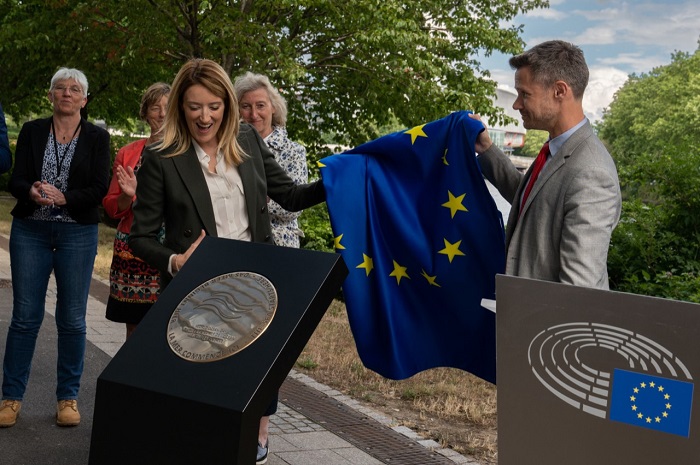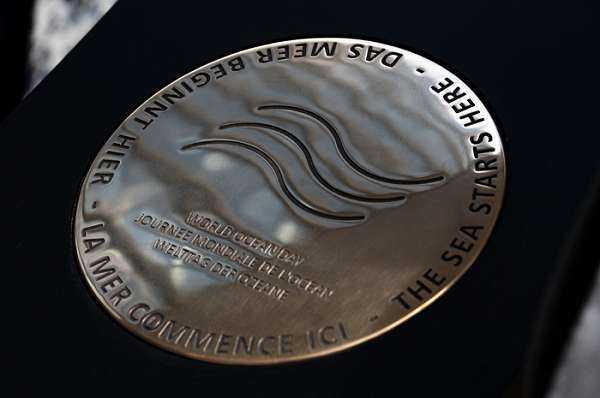On June 8, World Ocean Day marked the unveiling of a new plaque acknowledging the intimate relationship we share with the ocean, placed at the foot of the European Parliament in Strasbourg.
The aim of an annual World Ocean Day? To celebrate our oceans, and raise public awareness of the crucial role they play in our existence, as well as the different ways in which we can protect them. The concept for World Ocean Day was first introduced at the Earth Summit in Rio de Janeiro, in 1992. Three decades later, on June 8 2022, a plaque was enveiled in front of the European Parliament in Strasbourg bearing the symbolic message: "The ocean begins here".

The current President of the European Parliament, Roberta Metsola, offered a reminder that she originally comes from an island (Malta) and that she knows all too well how much we rely on the sea as a source of food, natural resources and a regulator for the climate. Indeed, it is these origins which often serve as a source of inspiration and reflection for her.
"More than half of the world's oxygen comes from the ocean, which proves how important it is for our health." Metsola also stressed just how quickly she has seen a noticeable deterioration in the sea, as a result of pollution and climate change. She then went on to emphasise that although many people think climate change primarily affects the land and the air, they often overlook the serious impact it has on the oceans and seas as well.
Marine Pollution Comes From the Land
"But we now know that the effects of global warming are also harmful to the sea, which requires us to pay even closer attention to our actions against global warming.
With approximately 80% of marine pollution coming from the land, the message of this plaque ("The ocean begins here") reminds us that even human activities on land, which may seem far removed from the seas and oceans, inevitably affect coastal and marine ecosystems too."
The EU President recalled the United Nations' theme for Ocean Day 2022: "Revitalisation: Collective Action for the Ocean". She believes it is crucial that the Parliament understands why taking action "every day, including on land, and not just in Europe but all over the world" is so important.

The EU must cooperate with the member states in order to create a new global approach. Hence the importance of the unveiled plaque which symbolises "commitment to the preservation of marine ecosystems and the recognition of harmful behaviours which need to be changed."
The Blue Economy Observatory
On May 19, 2022, the European Commission launched the EU Blue Economy Observatory. A new platform and source of information regarding the sustainability of our oceans, seas and coastal areas.
This observatory will focus on the socio-economic elements of the maritime sectors, as well as offer the latest data, scientific evidence, market information and findings on the EU's Blue Economy with the aim of providing a more detailed picture of activities related to the ocean.
[LIRE AUSSI >> LE SLOW-UP ALSACE RÉUSSIT SON GRAND RETOUR !]
Achieving the Objectives of the European Green Deal
The EU Blue Economy Observatory seeks to address the lack of sufficient data currently available concerning industries and activities related to our oceans, seas and coasts. In particular, this information will help policy makers and businesses to make appropiate decisions aimed at building a sustainable, resilient and climate neutral blue economy within the EU.
The platform also provides relevant information for the development, implementation and monitoring of policies, particularly important in light of the European Green Pact (a set of policies designed to make Europe climate neutral by 2050).
It will compile all of the Commission's existing knowledge, including that of the European Market Observatory for Fisheries and Aquaculture (EUMOFA) and the European Marine Observation and Data Network (EMODnet). It will also collaborate with the Blue Forum for sea users, a new initiative that is expected to be launched in late 2022.
Documentation Centre at the Lieu d'Europe in Strasbourg
So, what is the European Union doing to protect our oceans? The Documentation Center of the CIIE (Center of Information on Europeen Institutions), located on the first floor of the Lieu d'Europe (8 rue Boecklin) in Strasbourg, offers a selection of downloadable brochures and documents that cover this topic.
For example: "EU protects the Ocean: EU contribution to the One Ocean summit, Brest, 9-11 February"; "Regenerating our Ocean and Waters - What's in it for me?"; "Restoring our Ocean and Aquatic Environment: Concrete solutions to our biggest challenges".
So, what do we do?
Why are the ocean and the sea even more important than we may think? Well, because life itself is dependant on the health of our inter-connected system of oceans, seas and inland waters which cover roughly 75% of the Earth's surface.
Recently, Europe has introduced a new policy resulting in decisive action in favour of our oceans. And in early 2022, Horizon Europe published their first proposals aimed at supporting the roll-out of the European mission "Regenerating our Ocean and Waters by 2030".
These projects are expected to lead to new strategies specifically targeted at eliminating pollution and making the blue economy sustainable and carbon neutral. This is a goal of certain urgency given that 40% of the European population live in coastal areas. However, there are also economic motives behind these voluntary actions as the ocean is expected to generate... €2.5 billion worth of goods and services per year by 2030 (source: EU).
Lucie Michel